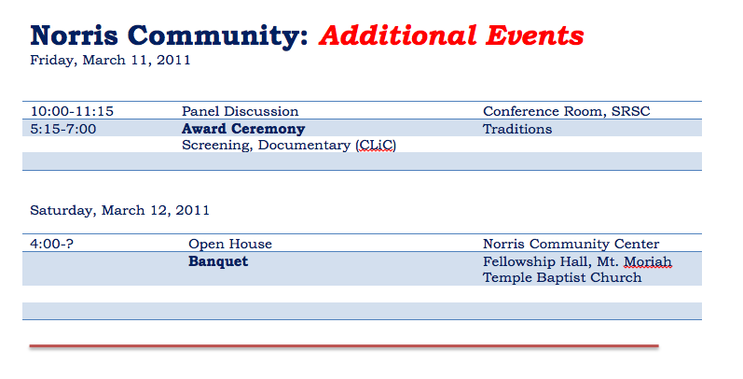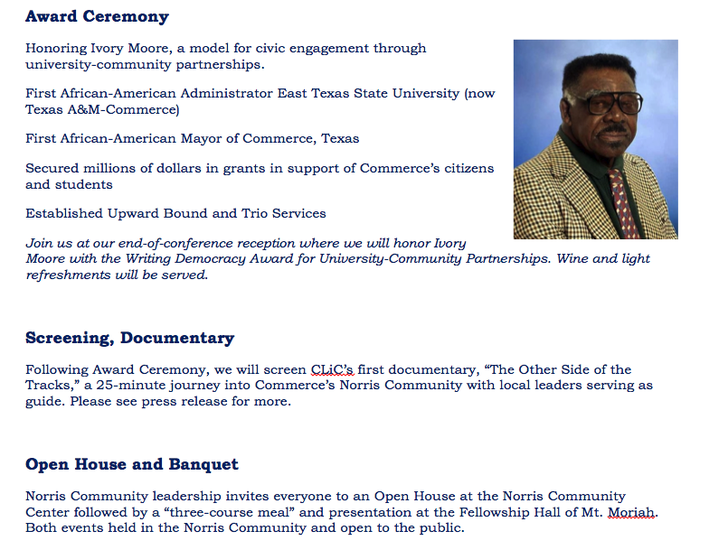| featured_panels.pdf |
Norris Community Club, established 1973
NCC was established in 1973 by community members and students to provide a direct line of communication between Commerce's African American citizens and city and university officials.
Shannon Carter has been studying NCC since 2008 as a model of successful university-community partnerships "writing for change" in local contexts. This is her second book project, but it is also a rich opportunity for successful partnerships with university archives (Jim Conrad, former Director, and Andrea Weddle, current Director), Commerce Public Library (Cheryl Westhafer, Local History Librarian), Journalism Department, and others across campus and in the community. Partnerships formed in course of her research and in deep collaboration with Jim Conrad yielded hours and hours of oral histories made available for current and future researchers, a Texas Historical Marker for the oldest African American church in Commerce, and a documentary about the Norris Community, the latter of which has been screened publically by large audiences both locally and regionally and aired on local television station on multiple occasions.
Writing Democracy conference included a Panel Discussion with NCC membership, an ceremony honoring NCC founding member Ivory Moore with first ever Writing Democracy Award, and, hosted by NCC in Norris Community the following day, a banquet open to the public.
Shannon Carter has been studying NCC since 2008 as a model of successful university-community partnerships "writing for change" in local contexts. This is her second book project, but it is also a rich opportunity for successful partnerships with university archives (Jim Conrad, former Director, and Andrea Weddle, current Director), Commerce Public Library (Cheryl Westhafer, Local History Librarian), Journalism Department, and others across campus and in the community. Partnerships formed in course of her research and in deep collaboration with Jim Conrad yielded hours and hours of oral histories made available for current and future researchers, a Texas Historical Marker for the oldest African American church in Commerce, and a documentary about the Norris Community, the latter of which has been screened publically by large audiences both locally and regionally and aired on local television station on multiple occasions.
Writing Democracy conference included a Panel Discussion with NCC membership, an ceremony honoring NCC founding member Ivory Moore with first ever Writing Democracy Award, and, hosted by NCC in Norris Community the following day, a banquet open to the public.
Featured Panel: Writing for (a) Change
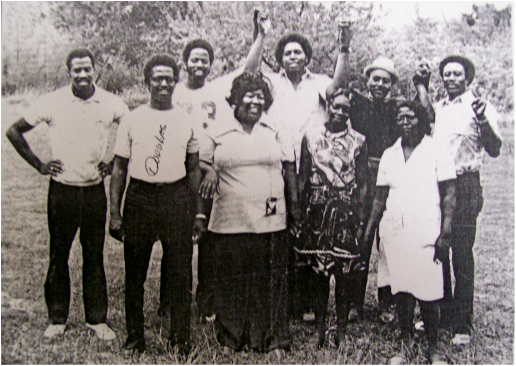
March 11, 2011, 11:00
Sam Rayburn Student Center
[Commerce, Texas]—The Norris Community Club (established in 1973) provides us with a model for enacting significant local change, especially through texts generated in true university-community partnerships. A group founded by long-time residents of Commerce's historically segregated neighborhood (the Norris Community) in partnership with university students, NCC provided "a direct line of communication" between the city officials and local African American citizens" (Billy Reed, NCC President).
At the time of the group’s formation, the needs of the Norris Community were many. Commerce had integrated only a few years before (1964), and the Jim Crow laws and customs that limited city services and support for local minority populations continued to choke progress and oppress its citizens residing in an area of town generally referred to as “the hole”: unpaved streets, inadequate street lamps, sewage systems either inadequate or non-existent. The list continues. In a few short years, however, the Norris Community streets were well lit and newly paved, sewage systems had been vastly improved, and Ivory Moore, a founding member of Norris Community Club and leader on campus and in the community, had been elected Commerce’s first African American mayor. He would go on to serve many terms on the Commerce City Council and bring in millions of dollars in grant monies to improve the infrastructure in Norris Community and opportunities for minorities and first-generation students by establishing programs like Upward Bound, Trio Services, and other support. Conditions and opportunities for minorities across the city continued to improve as a result of this productive partnership, which included grant writing, press releases, promotional materials, consciousness raising events, letter writing campaigns, and dozens of other local rhetorical actions to promote change.
Our panel brings together founding members from NCC, both former students and long-time residents, to discuss group’s origins, goals, and key accomplishments.
Panelists:
Shannon Carter will frame the conversation by foregrounding the ways in which the Norris Community Club wrote for change in this particular context at this particular time. Carter’s current book project investigates historical agency enacted through text use and production at local levels, especially through community-university partnerships. She has written extensively about NCC, and served as project lead for a recent documentary on the subject. For the past two years, Carter has worked with Conrad to collect local history associated with this project. Jim Conrad is an archivist and historian who has been credited with building the most significant repository of oral histories and other materials on Northeast Texas.
Allan Hallmark, Dr. Larry Mathis, and McArthur Evans will discuss their involvement with the Norris Community Club as students. Hallmark came to Commerce in 1973 to join the graduate program in Journalism after Vietnam and becoming heavily involved in anti-war demonstrations elsewhere. Evans and Mathis arrived in Commerce in the early 1970s as well, Evans by way of Chicago and Mathis by way of Colorado—both majored in Criminal Justice. A few short years later, these former students left Commerce to take positions in other parts of the country.
Sam Rayburn Student Center
[Commerce, Texas]—The Norris Community Club (established in 1973) provides us with a model for enacting significant local change, especially through texts generated in true university-community partnerships. A group founded by long-time residents of Commerce's historically segregated neighborhood (the Norris Community) in partnership with university students, NCC provided "a direct line of communication" between the city officials and local African American citizens" (Billy Reed, NCC President).
At the time of the group’s formation, the needs of the Norris Community were many. Commerce had integrated only a few years before (1964), and the Jim Crow laws and customs that limited city services and support for local minority populations continued to choke progress and oppress its citizens residing in an area of town generally referred to as “the hole”: unpaved streets, inadequate street lamps, sewage systems either inadequate or non-existent. The list continues. In a few short years, however, the Norris Community streets were well lit and newly paved, sewage systems had been vastly improved, and Ivory Moore, a founding member of Norris Community Club and leader on campus and in the community, had been elected Commerce’s first African American mayor. He would go on to serve many terms on the Commerce City Council and bring in millions of dollars in grant monies to improve the infrastructure in Norris Community and opportunities for minorities and first-generation students by establishing programs like Upward Bound, Trio Services, and other support. Conditions and opportunities for minorities across the city continued to improve as a result of this productive partnership, which included grant writing, press releases, promotional materials, consciousness raising events, letter writing campaigns, and dozens of other local rhetorical actions to promote change.
Our panel brings together founding members from NCC, both former students and long-time residents, to discuss group’s origins, goals, and key accomplishments.
Panelists:
Shannon Carter will frame the conversation by foregrounding the ways in which the Norris Community Club wrote for change in this particular context at this particular time. Carter’s current book project investigates historical agency enacted through text use and production at local levels, especially through community-university partnerships. She has written extensively about NCC, and served as project lead for a recent documentary on the subject. For the past two years, Carter has worked with Conrad to collect local history associated with this project. Jim Conrad is an archivist and historian who has been credited with building the most significant repository of oral histories and other materials on Northeast Texas.
Allan Hallmark, Dr. Larry Mathis, and McArthur Evans will discuss their involvement with the Norris Community Club as students. Hallmark came to Commerce in 1973 to join the graduate program in Journalism after Vietnam and becoming heavily involved in anti-war demonstrations elsewhere. Evans and Mathis arrived in Commerce in the early 1970s as well, Evans by way of Chicago and Mathis by way of Colorado—both majored in Criminal Justice. A few short years later, these former students left Commerce to take positions in other parts of the country.
Writing Democracy Award:
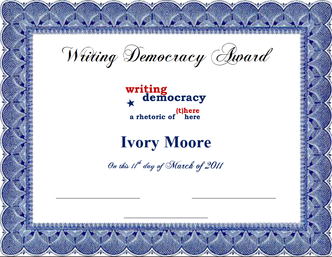
Ivory Moore, Commerce, Texas
Screening: "The Other Side of the Track"
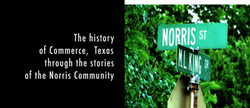
Trailer http://vimeo.com/19984989
Full: http://vimeo.com/20289812
Project Supervisor: Shannon Carter (CLiC Director)
Directed by: Luca Morrazzano
Documentary by CLiC (Converging Literacies Center, Texas A&M-Commerce)
Press Release for first screening--
[Commerce, Texas]—The new documentary film The Other Side of the Track will debut at the Texas A&M-Commerce campus later this month in celebration of Black History Month. Documentary is the first to be produced by the Converging Literacies Center (CLiC), and those involved hope others will follow. “We are actually pursuing a media grant for another, related project that is grounded in themes like those driving The Other Side: engaged citizenship and community leadership across rural, Northeast Texas,” explains CLiC co-director and project supervisor Dr. Shannon Carter. Carter is an English professor at Texas A&M-Commerce who studies activism in the rural south.
The screening—on Monday, February 21, 2011, at 3:00—will take place in the Hall of Languages on the A&M-C campus in conjunction with the first CLiC Talk of 2011, a regular, interdisciplinary lecture series dedicated to texts and writers in twentieth-century, everyday contexts. Immediately following the screening of this 25-minute film, individuals featured in the film will join those involved in its creation for a conversation about race relations featured in film and community.
The film takes viewers on a moving journey into the everyday experiences of Commerce’s local African-American community before integration, with local leadership serving as guides. Existing within Commerce city limits since the 1890s, the Norris Community was home to the vast majority of Commerce’s African American population for much of the 20th century. Not unlike other black communities throughout the segregated south, the Norris Community was the site for the all-black Norris School and businesses (barber shops, grocery stores, restaurants) serving Commerce’s African American citizens in the years before they had access to the shopping, entertainment, and schools serving the white population.
Similar communities existed throughout the south until Jim Crow laws and customs gave way to integration in last half of the 20th century.
What is most unique about the documentary and the lives it chronicles is the levels of civic engagement these individuals reveal and, by example, encourage in the film’s audience. This is not the rural south we expected. Or is it? The project’s creative lead Luca Morazzano (PhD student and research assistant for CLiC) describes the project this way: “Through this documentary – as a filmmaker with the attitude of an ethnographer - I let Commerce speak about itself. The slow rhythm of a small town was filmed along with the stories of its citizens who made its (hi)story.”
Morazzano began working with Drs. Carter and Conrad more than a year ago, dragging a large camera borrowed from Media Services across town to take part in countless oral history interviews with locals, compile footage from tours of the Norris School (empty for some years), the oldest African-American church in town, the Norris Community Club, and the original, segregated cemetery. He produced the film over the summer from his home in Italy. Morazzano has extensive experience with documentary films, but this was his first experience with race relations in the American South. As an Italian from an urban environment (Rome), however, Morazzana came to this project knowing far less about rural Texas and related ideas. That fresh perspective and his attention to detail led the project in new and exciting directions. It is his hope to complete another documentary about race relations in this area before he completes the PhD program next year.
Panel discussion that follows screening will include filmmaker Morazzano, but it will also feature individuals starring in documentary and local history. Together attendees and panelists will explore topics like local responses to the civil rights movement, including the integration of Commerce ISD and East Texas State University in the mid 1960s and collective efforts like the Norris Community Club (NCC) advocating change for local black citizens. The NCC was established in 1973 to provide “a clear line of communication” among Norris Community residents, the Commerce City Council, and ETSU (now Texas A&M-Commerce). Panelists include founding members of the Norris Community Club Ivory Moore, Billy Reed, and Opal Pannell.
Additional information available at http://www.convergingliteraciescenter.wordpress.com
Contacts:
Shannon Carter, Associate Professor of English, Texas A&M-Commerce
[email protected]
